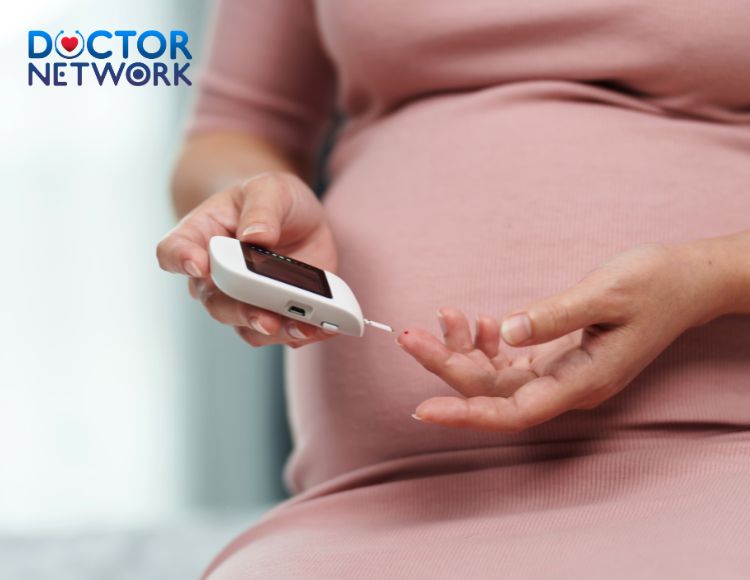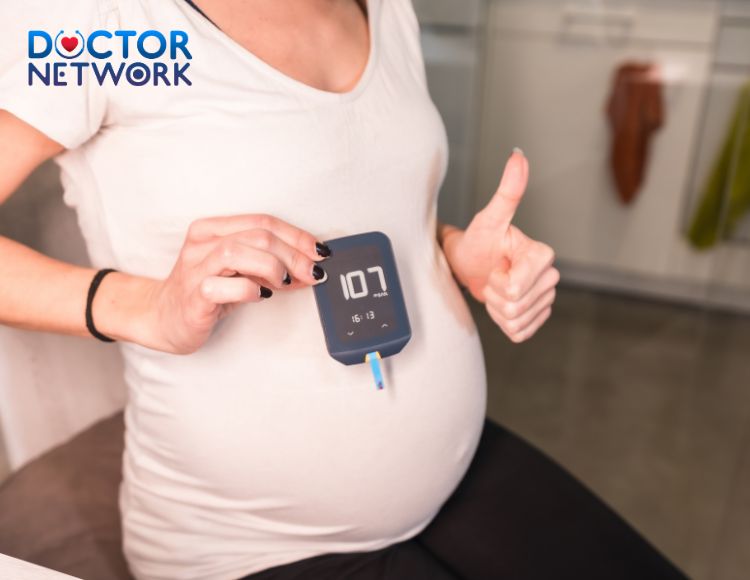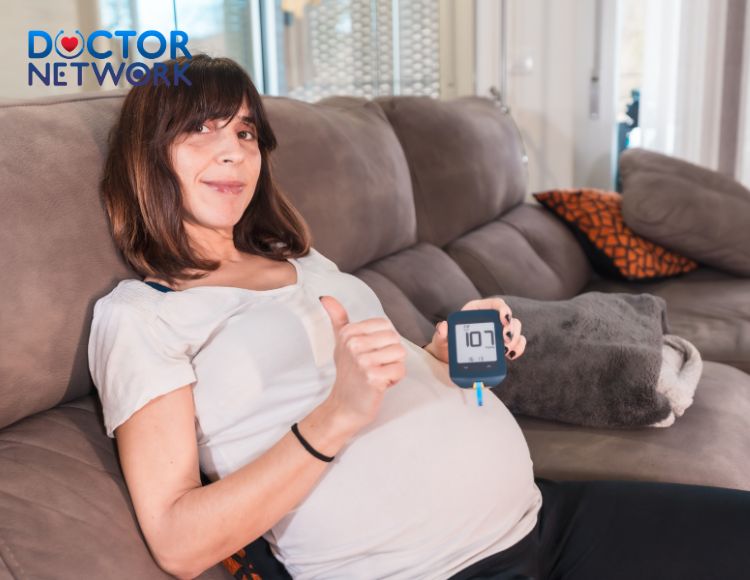Gestational diabetes mellitus (GDM) is characterized by abnormally high blood glucose levels during pregnancy. While it may not always present with clear symptoms, uncontrolled GDM can have significant adverse effects on both the mother and the fetus. Pregnant women should be vigilant for the following “gestational diabetes signs“.
Common Signs of Gestational Diabetes
- Excessive thirst during pregnancy: Pregnant women may constantly feel thirsty and drink large amounts of water without relief from dry mouth. This is due to increased renal activity needed to excrete excess glucose through urine.
- Frequent urination during pregnancy: There is a noticeable increase in urination frequency, especially at night, which disrupts sleep and affects maternal rest quality.
- Persistent fatigue during pregnancy: Prolonged feelings of fatigue or even exhaustion despite adequate rest are notable symptoms of gestational diabetes. Inefficient glucose metabolism contributes to this condition.
- Vaginal yeast infections during pregnancy: Imbalance in vaginal pH due to high glucose levels in urine creates favorable conditions for yeast growth, leading to itching, discomfort, and increased vaginal discharge.

“gestational diabetes signs” – vaginal infection during pregnancy
- Rapid weight gain during pregnancy: Weekly weight gain exceeding recommended thresholds or excessive weight gain within a short period should be carefully monitored, as it could indicate gestational diabetes.
- Delayed wound healing during pregnancy: High blood glucose levels hinder the healing process of cuts and scratches on the skin. If a pregnant woman notices unusually slow healing of minor wounds, blood sugar levels should be checked.
Less Common Signs of Gestational Diabetes
- Temporary vision impairment due to unstable blood sugar levels.
- Unexplained weight loss despite being in pregnancy.
- Urinary tract infections with symptoms such as painful urination, cloudy urine, or unusual odor.

“gestational diabetes signs” – Temporary vision loss due to unstable blood sugar
Diagnosis and Monitoring of Gestational Diabetes
- Between weeks 24-28 of pregnancy, doctors typically recommend screening for gestational diabetes. This is a critical step in early diagnosis.
- Pregnant women undergo a glucose challenge test followed by blood sugar level checks at specific intervals.
- If diagnosed with gestational diabetes, regular blood sugar monitoring and adherence to physician’s guidelines are crucial for disease management.
Prevention and Control of Gestational Diabetes
- Adopting a balanced diet, limiting refined sugars and starches.
- Engaging in light physical activities suitable for pregnancy such as walking, prenatal yoga.
- Regular monitoring of blood sugar levels as per medical advice.
- Regular prenatal check-ups and discussing any unusual signs of gestational diabetes with healthcare providers.

Regular prenatal checkups to detect “signs of gestational diabetes”
Some Questions Related to “Gestational Diabetes Signs”
Here are 5 questions related to “gestational diabetes signs”:
I have symptoms like excessive thirst and frequent urination – Could I have gestational diabetes?
Answer: Excessive thirst and frequent urination during pregnancy are common signs of gestational diabetes. However, based solely on these symptoms, a definitive conclusion cannot be drawn. You should visit a reputable healthcare facility to undergo testing for gestational diabetes to obtain an accurate diagnosis.
Is gestational diabetes dangerous?
Answer: Gestational diabetes, if not detected and managed promptly, can lead to serious complications for both the mother and the baby, including:
- For the mother: Increased risk of preeclampsia, infections, difficult childbirth, postpartum hemorrhage, etc.
- For the baby: Macrosomia, low blood sugar after birth, respiratory issues, increased risk of developing type 2 diabetes later in life, etc.
Which groups are at higher risk of developing gestational diabetes?
Answer: You are at higher risk of developing gestational diabetes if you:
- Have a family history of diabetes
- Are overweight or obese before pregnancy
- Have had gestational diabetes in a previous pregnancy
- Are over 35 years old
- Have polycystic ovary syndrome (PCOS)
Will gestational diabetes resolve after childbirth?
Answer: In most cases, gestational diabetes tends to resolve after childbirth. However, the mother’s blood sugar levels need to be monitored, and there remains a higher risk of developing type 2 diabetes later on. Therefore, maintaining a healthy lifestyle and regular health check-ups are crucial.
If diagnosed with gestational diabetes, can I still have a vaginal delivery?
Answer: The possibility of having a vaginal delivery when diagnosed with gestational diabetes depends on various factors such as the mother’s blood sugar control, the health status of both mother and baby, the size of the baby, etc. Obstetricians will provide specific advice and suggest the most appropriate delivery plan for each case.
Scientific Evidence Related to “Gestational Diabetes Signs”
Here are some scientific references related to “gestational diabetes signs”:
- Excessive thirst and frequent urination:Study: A 2016 study published in the Journal of Clinical Endocrinology and Metabolism showed that excessive thirst and frequent urination are the most commonly reported symptoms affecting 73% and 68% of women with gestational diabetes, respectively.
- Fatigue:Research: A 2018 review published in Diabetes Care highlighted fatigue as a common symptom of gestational diabetes, affecting up to 70% of women with the condition. The study concluded that fatigue is due to increased energy demands to process excess sugar.
- Vaginal infections:Evidence: A 2014 study published in the Journal of Obstetrics and Gynecology found that women with gestational diabetes have a fourfold higher risk of vaginal yeast infections compared to those without the condition. High sugar levels in the vagina create favorable conditions for fungal growth.
- Slow wound healing:Study: A 2013 study published in the Diabetes Research Journal found that women with gestational diabetes have slower wound healing rates compared to those without the condition. Slow healing is linked to high blood sugar levels.
- Changes in vision:Research: A 2010 study published in the Journal of Clinical Ophthalmology showed temporary blurred vision as a common symptom in women with gestational diabetes, affecting up to 10% of participants. Visual disturbances were attributed to fluctuations in blood sugar levels.
Additional Scientific Notes:
The American College of Obstetricians and Gynecologists (ACOG) recommends screening for gestational diabetes between weeks 24 and 28 of pregnancy for all pregnant women.
Early diagnosis and management of gestational diabetes can significantly reduce the risk of complications such as macrosomia, preeclampsia, and neonatal hypoglycemia.
Maintaining a healthy diet, regular exercise, and monitoring blood sugar levels are essential strategies for managing gestational diabetes and promoting a healthy pregnancy outcome.
Conclusion
Early detection of gestational diabetes signs enables effective management strategies, minimizing risks for both mother and child. Pay attention to even minor changes in your body during pregnancy, and remember to attend regular prenatal appointments for timely gestational diabetes screening by healthcare professionals.
References:
https://www.vinmec.com/vi/tin-tuc/thong-tin-suc-khoe/san-phu-khoa-va-ho-tro-sinh-san/nhung-dieu-can-biet-ve-dai-thao-duong-thai-ky/
https://hongngochospital.vn/vi/tieu-duong-thai-ky
Kiểm Duyệt Nội Dung
More than 10 years of marketing communications experience in the medical and health field.
Successfully deployed marketing communication activities, content development and social networking channels for hospital partners, clinics, doctors and medical professionals across the country.
More than 6 years of experience in organizing and producing leading prestigious medical programs in Vietnam, in collaboration with Ho Chi Minh City Television (HTV). Typical programs include Nhật Ký Blouse Trắng, Bác Sĩ Nói Gì, Alo Bác Sĩ Nghe, Nhật Ký Hạnh Phúc, Vui Khỏe Cùng Con, Bác Sỹ Mẹ, v.v.
Comprehensive cooperation with hundreds of hospitals and clinics, thousands of doctors and medical experts to join hands in building a medical content and service platform on the Doctor Network application.

























